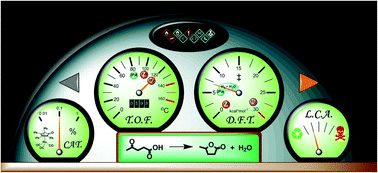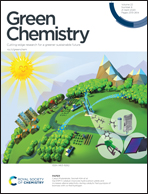Solvent-free hydrogenation of levulinic acid to γ-valerolactone using a Shvo catalyst precursor: optimization, thermodynamic insights, and life cycle assessment†
Abstract
The hydrogenation of levulinic acid (LA) to γ-valerolactone (GVL) using the η4-(2,3,4,5-tetraphenylcyclopentadienone) ruthenium tricarbonyl precursor of the well-known Shvo catalyst and H2 pressure was established under solvent-free conditions to achieve 100% conversion and 100% selectivity within 5 hours. Kinetic reaction curves were measured in order to deduce the optimal reaction conditions, which were further evaluated by means of density functional theory (DFT) calculations, and compared with catalytic concepts that consume formic acid or isopropyl alcohol as hydrogen donor. Ultimately, this alternative reaction procedure was subjected to a life cycle assessment (LCA) in comparison with the transfer hydrogenation methodologies, in order to verify its contribution towards a practice of environmentally benign chemistry.



 Please wait while we load your content...
Please wait while we load your content...